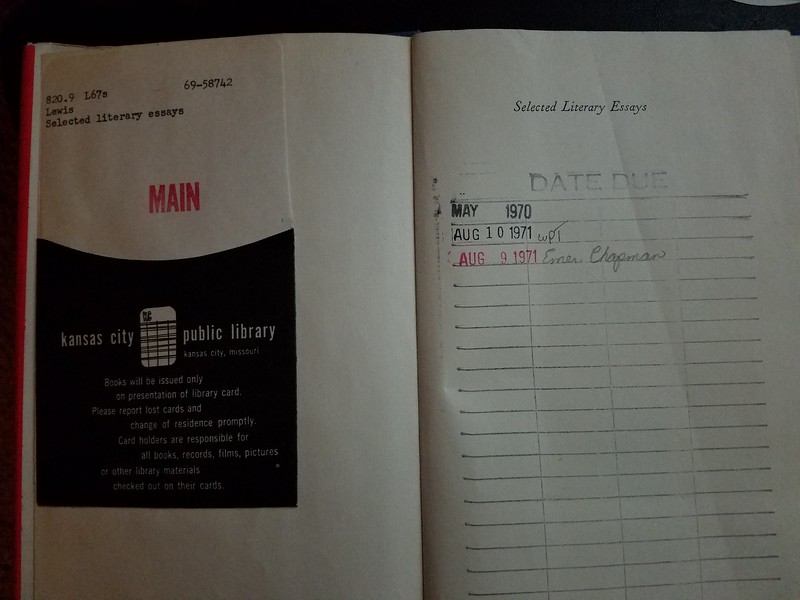Clive Staples “Jack” Lewis (1898 ~ 1963)

Today would have been the 121st birthday of C.S. Lewis. A week ago today marked the 56th anniversary of his death, which was, at the time, overshadowed by the assassination of President Kennedy.
To celebrate his birthday, I decided to read the second essay found in the 1969 edition of Selected Literary Essays by C.S. Lewis, edited by Walter Hooper. Interestingly, the copy I checked out from the Kansas City Public Library may be a first edition. If not, it’s been in circulation for fifty years, as evidenced by date stamps through early 1996, after which, I assume, the Library moved from analog to digital (card catalog to barcodes):


I originally checked out this volume specifically to read the 21st essay entitled “Psycho-Analysis and Literary Criticism” which was referenced in a footnote in an essay I read recently in A Tolkien Compass. For today, though, I wanted to celebrate the friendship between C.S. Lewis and J.R.R. Tolkien, so I read, instead, the second essay entitled “The Alliterative Metre.”
The essay covers many of the rules governing alliterative verse, including these definitions:
- The half-line consists of Lifts and Dips. Every half-line must contain neither more nor less than two Lifts.
- A Lift is either (1) one syllable both long and accented (as the first syllable of ogre or mountain); or (b) two syllables whereof the first is short but accented, and the second unaccented (as the first two syllables of merrily, vigorous, melancholy, evident).
- A Dip is any reasonable number of unaccented syllables whether long or short.
Despite my best efforts, I quickly got sidetracked by yet another footnote. It all began with a short example alliterative verse, composed (I’m assuming) by Lewis.
We were TALKing of DRAGONS, | TOLkien and I
In a BERKshire BAR. | The BIG WORKman
Who had SAT SILent | and SUCKED his PIPE
ALL the EVEning, | from his EMPTy MUG
With GLEAMing EYE | GLANCED toWARDS us;
"I SEEN 'em mySELF', | he SAID FIERCEly
Note: Syllables printed above in capitals are Lifts, the rest are Dips.
The first and most distracting footnote followed the word ‘fiercely’ and read:
Continue reading “Celebrating Clive Staple’s 121st”


